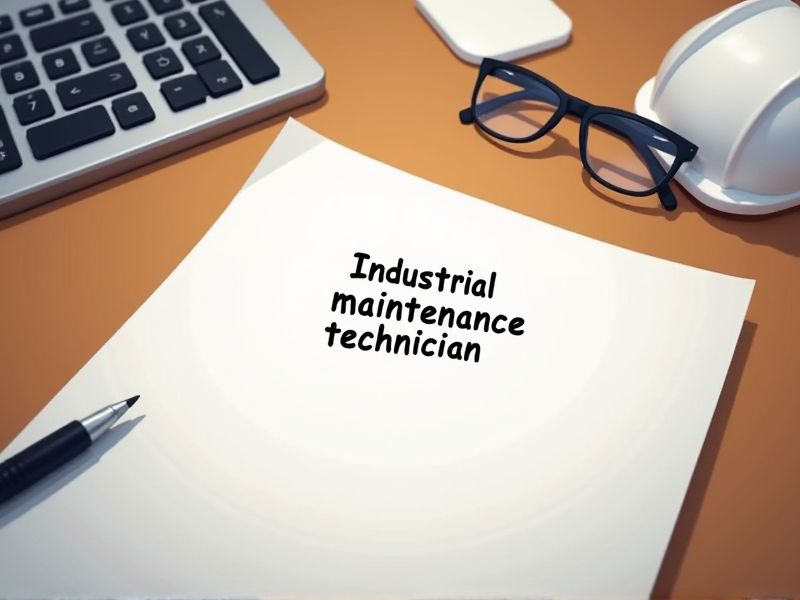
Industrial maintenance technicians are tasked with ensuring the optimal performance and longevity of machinery, which directly impacts production efficiency and safety. Certifications are often required because they provide standardized and verified knowledge, skills, and competencies needed to handle complex systems. Without these credentials, technicians may lack the credibility or expertise necessary to address technical challenges effectively. Here are key certifications that may be essential for an industrial maintenance technician.
Certified Maintenance & Reliability Technician (CMRT)
A Certified Maintenance & Reliability Technician (CMRT) is crucial because it validates a technician's skills and knowledge, ensuring they meet industry standards. This certification enhances workplace efficiency by minimizing downtime through the application of best practices. The CMRT designation also boosts a technician's employability and career advancement opportunities by demonstrating commitment to professional development. Industrial facilities benefit from reduced operational costs and improved reliability when employing certified technicians.
OSHA 10/30 Safety Certification
Industrial maintenance technicians face numerous hazards, such as machinery accidents, chemical exposure, and electrical shocks, making OSHA 10/30 Safety Certification vital for understanding these risks. This certification equips them with critical safety protocols and preventive measures, reducing workplace accidents and injuries. Employers require certified technicians to ensure compliance with safety regulations and create a safer work environment. The certification fosters a safety-first culture, enhancing overall operational efficiency and minimizing potential downtime caused by safety incidents.
NFPA 70E Electrical Safety Certification
NFPA 70E Electrical Safety Certification provides industrial maintenance technicians with essential knowledge to prevent electrical accidents. This certification ensures compliance with safety standards, reducing workplace hazards and increasing operational safety. Trained technicians can identify electrical risks and implement safety practices effectively, minimizing the chance of downtime caused by incidents. Organizations benefit from reduced liability and adherence to regulatory requirements, promoting a safer work environment.
Electrician Certification
Industrial maintenance technicians work with complex electrical systems, requiring precise knowledge to ensure efficient and safe operations. Electrician certification verifies a technician's competency in handling high-voltage equipment and intricate wiring, reducing the risk of accidents and malfunctions. Certification enhances problem-solving capabilities, enabling technicians to identify issues more effectively and implement solutions. Employers value certified professionals for compliance with regulations, decreasing liability and increasing operational reliability.
PLC Programming Certification
Industrial processes increasingly depend on automated systems, and certification in PLC programming equips technicians with the skills necessary for maintaining these systems efficiently. As industries adopt more complex machinery, certified technicians can diagnose and repair issues faster, minimizing downtime. Companies prefer technicians with such certifications as they demonstrate a standardized level of competence and reliability. The demand for skilled maintenance personnel is high, and certification often leads to better job opportunities and career advancement.
Hydraulic & Pneumatic Systems Certification
Certification in hydraulic and pneumatic systems provides industrial maintenance technicians with validated expertise, which increases their employability and credibility. Employers recognize certified individuals as being more knowledgeable and capable of efficiently maintaining and troubleshooting complex systems. Certified technicians often reduce downtime and improve equipment reliability, directly impacting the productivity and profit margins of industrial operations. Formal certification ensures technicians maintain industry standards and safety protocols, protecting both the equipment and the workforce.
AWS Certified Welder
An AWS Certified Welder provides assurance of expertise in performing welding tasks critical for maintaining industrial equipment. Proper welding ensures the structural integrity of machinery, minimizing downtime due to equipment failure. Compliance with safety and quality standards is reinforced through certification, reducing potential hazards. Certification signals proficiency, increasing productivity and decreasing training time for industrial maintenance teams.
Lean Six Sigma Green Belt Certification
Lean Six Sigma Green Belt Certification equips industrial maintenance technicians with problem-solving skills, increasing process efficiency. By mastering these techniques, technicians can identify and eliminate waste, leading to cost reductions and improved productivity. Gaining this certification enhances their ability to minimize equipment downtime, ensuring uninterrupted manufacturing processes. The certification also boosts career prospects by validating expertise in quality management and operational excellence.
Industrial Equipment Repair Certification
Industrial Equipment Repair Certification provides standardized knowledge, ensuring technicians possess the essential skills for effective maintenance. Certified technicians demonstrate competence, reducing machine downtime and improving operational efficiency. Employers often mandate this certification to comply with industry regulations and safety standards. Certification can enhance career prospects and job security for maintenance technicians by validating their expertise.
Certified Facility Manager (CFM)
Certified Facility Managers (CFM) bring structured expertise that directly enhances the efficiency and safety of industrial maintenance operations. Their advanced training aligns maintenance strategies with organizational goals, leading to reduced downtime and operational costs. CFM credentials validate skills in risk management and compliance, essential for adhering to industry regulations. Professional credibility and knowledge in integrating sustainable practices support long-term facility health and performance.
Summary
By obtaining certifications, you enhance your credibility and open new career opportunities in the industrial maintenance field. This certification can lead to increased confidence in job performance, resulting in efficiency improvements. Employers may recognize your certified skills with potential salary raises, providing financial motivation. The industry benefits too, as certified technicians contribute to reduced downtime and safety improvement.
